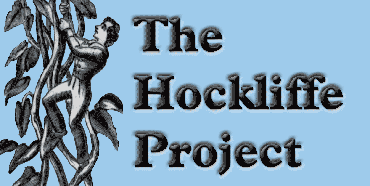

 |
|
 |
| Previous | Next |
| Author: | Meeke, Mary |
| Title: | The Birthday Present: or, Pleasing Tales of amusement and instruction. Embellished with sixteen neatly coloured engravings. By Mrs. Meeke |
| Cat. Number: | 0177 |
| Date: | No date |
| 1st Edition: | |
| Pub. Place: | London |
| Publisher: | Dean & Munday, Threadneedle Street |
| Price: | 1s |
| Pages: | 1 vol., 36pp. |
| Size: | 16.5 x 10 cm |
| Illustrations: | |
| Note: |
Images of all pages of this book
The Birthday Present is not about a birthday present, as, for instance, is Maria Edgeworth's tale of the same name (0102). It presumably derives its title purely from the hope that it would be thought an appropriate gift for a child. This sales psychology seems to have paid off, for one of the Hockliffe copies bears the inscription 'Edward George Jepson / a Present from / Harrogate 31st July / 1824'.
The book consists of several very short stories:
1. 'Carelessness always brings its own punishment', which actually contains two very brief narratives (p.5)
2. 'We must never praise ourselves' (p.12)
3. 'Never suffer temptation to induce you to do wrong' (p.15)
4. 'Kind behaviour is sure to soften the hardest of hearts' (p.18)
5. 'The crying child corrected by his father's prudent conduct' (p.22)
6. 'Never let your amusements interfere with your studies' (p.25)
7. 'Wanton cruelty to animals deserves the severest punishment' (p.28)
8. 'Too much indulgence often spoils the best of tempers' (p.33)
These titles are fairly self-explanatory. The first two narratives, combined under the first heading, are cautionary tales rather in the manner of Heinrich Hoffman's Struwwelpeter or Hillaire Belloc's Cautionary Tales, but without their humour. The children - Louisa who plays with a knife and a candle, and George, who does not look where he is going and holds pins in his mouth - come to bad ends. Louisa accidentally sets fire to her hair, and bears the scars throughout her life. A pet dog leaps on George while he has the pins in his mouth, and he swallows them, which leads to a lingering death. The children of the other tales fare rather better. Though they might be naughty - eating the cakes which fall from the pieman's tray, or weeping at every little tribulation - they reform by the end of the tales, generally as a result of strict but salutary parental discipline. Unusually, one child is criticised for too much affection for animals - for she dotes too much on her pet cat ('Never let your amusements interfere with your studies'). The answer is simply to banish the cat to the far side of town, and after a while the girl sees the error of her ways. A more normal attitude is taken in the following tale ('Wanton cruelty to animals deserves the severest punishment'), in which a boy who has beaten his dog is prevented from going on a day-trip by his father.
Overall, the most notable feature of The Birthday Present is its simple but very effective wood-engravings. It is also illuminating to notice what kind of children the book represents. Its protagonists are all from affluent backgrounds, and possess a multitude of toys - from kites and carts to dolls (charmingly pictured p.27) and an elaborate model ship (p.19). The book is depicting, in other words, the sort of youthful consumer, with extensive and expensive possessions, at whom the book itself, with its suggestive title, was being marketed.
Hardly anything is known about Mary Meeke, the author of The Birthday Present, save that she was an extremely prolific author of novels. She wrote at least 28, as well as 5 translated works, sometimes using the pseudonym 'Gabrielli'. She probably married a clergyman, and published poet, the Rev. Francis Meeke (B.A. 1773, M.A. 1776, Cambridge), and she possibly died in October 1816. See Enger 1992: 187-91 and the Dictionary of National Biography, for what little is known about Meeke's life and work.
A. K. Newman and Co., publishers of one of the editions in the Hockliffe Collection (0176), were operating from c.1809 until the late 1840s. Dean and Munday, publishers of the other Hockliffe edition (0177), were publishing from c.1811 until the middle of the century. Given the date of the inscription in 0176 - 1824 - and the probable fact that the author died in 1816, it seems most likely that The Birthday Present was published in sometime between 1815 and 1824. Which of the editions in the Hockliffe collection is the earlier must remain a matter of speculation. They are almost identical. Indeed, both editions were published by Dean and Munday, suggesting that the book was a joint venture.
Enger, Ann W., 'Mary Meeke', pp.187-91 in The Dictionary of Literary Biography: vol.116: 'British Romantic Novelists 1789-1832', ed. Bradford K. Mudge, Detroit, MI: Gale Research Inc., 1992
Lee, Stephen (ed.), Dictionary of National Biography, London: Smith, Elder, and Co., 1892 and after